#because it also shows the power of catharsis
Text
Quick Falin analysis. Congrats on her going along with her loved ones’ wishes becoming explicitly canon and not subtext btw!
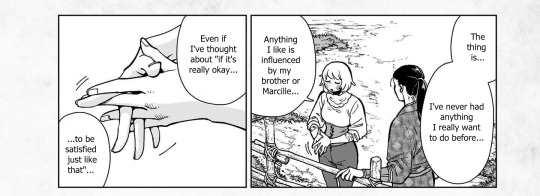
Thinking of it, becoming a chimera and literally being puppeteered around by the will of the dungeon and its lord is such an… Explicit visualization of her demeanor in life of letting others’ wants and whims dictate what she does and where she goes. Shows the most extreme & worst version of it, of where that could lead her down the road. Dunmeshi loves often showing that with everyone, with the winged lion warping even the most selfless well-intentioned desire into something intense and destructive.
If Faligon is her retreating into that comfortable role of just on-pilot mode following what others want, that’d be an interesting angle too. Because we see like with the dragons fight at Thistle’s house that the monsters CAN act rebellious, meanwhile Falin was just so on board with the commands she got ever since she got transformed.
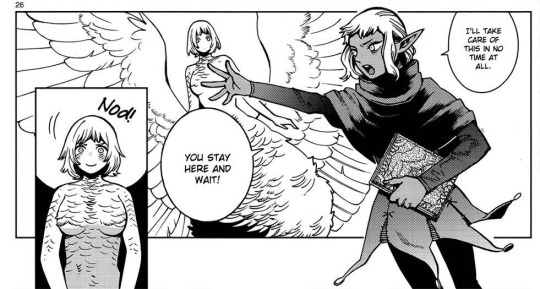
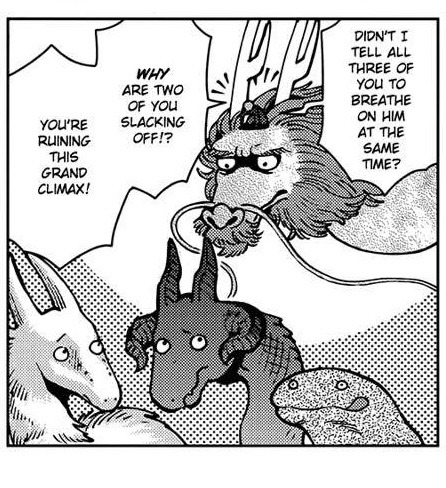
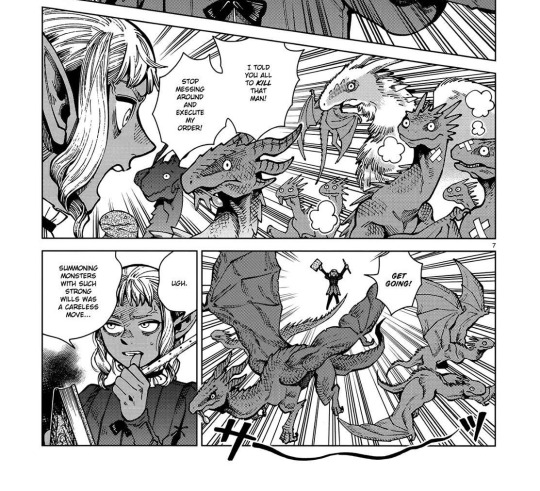
Chimera Falin doesn’t have a strong will? Oof
I do also think that Thistle is something that her nursing reflexes latch onto easily, when it comes to comforting and protecting others. It’s unsure how much of her is dormant as Faligon, or how being bound to the dungeon and the dungeon lord’s will affects her, but it’s undeniable that she acts with care when it comes to Thistle. On one hand, she fights ferociously for him, when protecting him or even just sent out to scout, but you can’t really say she’s being assertive either, not when she doesn’t complain or act when he eats all the berries and she’s hungry. She’s still that silent, sidelined guardian, only now very, very literal.

I never bought the angle that chimera Falin mostly represented her repressed anger at the world personally, like yes now she’s loud and big and imperfect, but again, socially she falls into the same pitfalls, it’s just that now she’s top dog, below just one person, and so she’s allowed to be aggressive with everyone else. If anything, it’s the dragon soul pushing her to want more, making her act out, giving her a taste of how it feels to be powerful, carefree and impossible to oversee, but it couldn’t be called catharsis I think. In general, she seems more passive with a "as long as I have what I love, everything else can go burn for all I care" mentality rather than actively(or repressedly) angry to me. Not that she couldn’t have complex feelings over being lonely and cast out either of course, but personally I never got the sense that she resents the world or society at large.
I do feel like the dogs treating her like she was at the bottom of the hierarchy also shaped her a lot
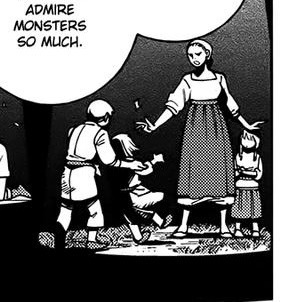
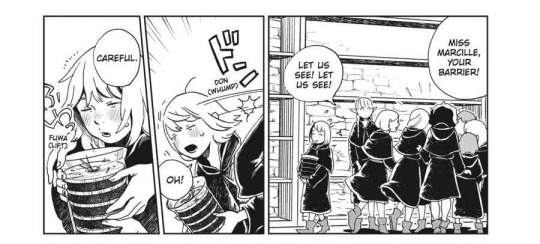
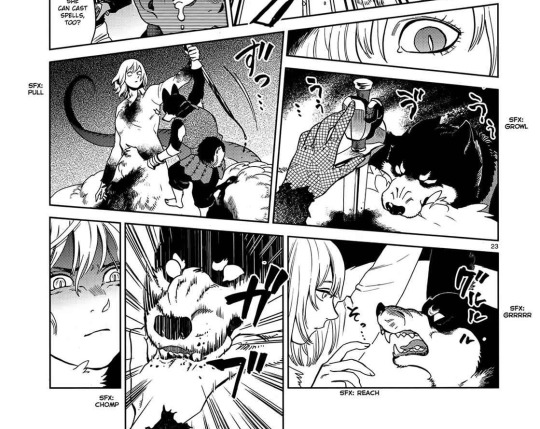
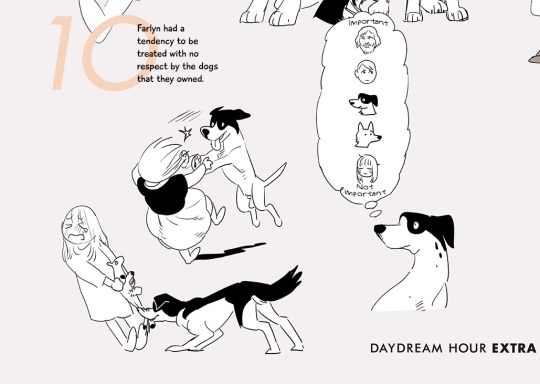
Not only cast out by other kids and classmates, but also treated as someone that can be disrespected and roughened up by the dogs at home. She was really pushed into that go with the flow, make yourself scarce and quiet attitude. She’s never really been allowed to hope for better, or to have a dream of her own, her life path being decided for her by others.
Besides with Laios, everything she learned everywhere in group dynamics was that she was at the bottom and should be content with whatever others gave her. Maybe that’s why she was so forgiving of her parents too, because at least, to some degree they did care and didn’t want to cut contact, and she takes what she can get.
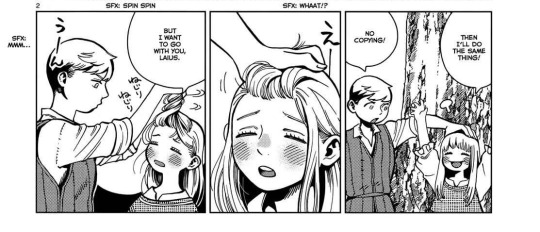

Thank you @thatsmimi for the fantranslation of the new leaked content, the opening and ending pictures in this post. Their original post about it is here, and as mentioned it is not the official translation.
#She hesitates on hurting the kobold but not everyone else? Oof#And even with Laios as kids he enforced the hierarchy by wrestling and all tbh#I don’t expect kids to have a good and compassionate grasp on social dynamics but he wasn’t always the kindest#Not a defense of the parents btw. Wtf were they doing#Dungeon meshi#falin touden#analysis#character analysis#so interesting how Falin just doesn’t have presence#Dungeon meshi manga spoilers#spoilers#thistlin#the dragon soul is a positive influence on her <3
296 notes
·
View notes
Text
So like, I'm pretty darn sure Mo Xuanyu did not actually make a pass at Jin Guangyao.
For several reasons, like for one thing hitting on your own actual brother who is also your boss is genuinely insane behavior, in a way nothing else we know about the guy actually matches, other than his reputation for being crazy which mostly seems to originate from the same point as the sexual harassment allegations. which tracks because even with rampant societal homophobia, that's such a crazy thing to do people would question it if it didn't come paired with the information that he's insane.
Then there's the fact that if that had actually happened, there's basically no way master spin artist jgy would have let it get out, because actually experiencing that would trigger his sense-of-uncleanliness issues so hard.
But what we see is that somehow Everyone Knows that it happened, but also that Jin Guangyao totally didn't tell anyone, because he's too merciful and kind and respectable. It just mysteriously leaked somehow that this private scandal happened.
(Also, to step up a meta level, the gay goth kid who was never quite accepted into his own family and wound up self-destructing was in fact guilty of the homophobic allegations spread by the powerful man who manipulates reputation for personal advantage? This is not the kind of story where that would be true. The thematic dissonance is too much.)
The only way it's believable that mxy made a move on jgy is if jgy spent a long time maneuvering him into it, hinting and deniably flirting and just generally being maximum skeeze, just a huge elaborate incestuous honeypot, just to bait a 'ruined reputation' trap. Which makes no sense at all.
I don't think jgy is necessarily above that kind of creepy grooming behavior but I do think he would hate it, and definitely wouldn't resort to it when sowing rumors would work just as well. and expose him to less risk.
So Mo Xuanyu didn't do it.
So what we've got is that Jin Guangyao systematically obliterated this kid's credibility.
No one would listen to anything he said after being expelled in that sort of context, especially anything against Jin Guangyao, whom he now has obvious motive to smear. This was a preemptive strike against some kind of leak.
It's exactly the kind of thing jgy would do--it targets individual vulnerability, leverages the weak points in Mo Xuanyu's reputation into gaping chasms, in a way that associates jgy with scandal but makes him personally look better. also shows signs of jgy projecting his own issues onto others. The MO fits.
And his motive is easy to construct: Mo Xuanyu had had access to his secrets, such as Wei Wuxian's manuscripts and probably a lot of the other ugly shit. And Jin Guangyao needed him silenced, due to some thing or other, but as with SiSi didn't want to have to kill him.
(A fascinating thing about jgy as a villain is the moments where he yields to sentiment pretty consistently contribute to his destruction.)
But then we come around to: so why didn't Mo Xuanyu sic Wei Wuxian on Jin Guangyao, then?
In cql wwx does have a curse cut for jgy, to keep him in the plot and create an additional open storyline to resolve, since viewers are gonna be denied romantic catharsis, but in cql the homophobia plotline isn't there because all the gay is censored, and mxy allegedly hit on qin su instead. which is less utterly unhinged to do though still big wtf.
In the book, mxy summoned the Yiling Patriarch just to kill the Mos. (Which he didn't even do lmao.)
So I've always been sort of poking at that, like if you're destroying your own soul to get revenge, why spare the person who deliberately ruined your life?
Even if he had done the thing, it was weird! Maybe even weirder; if you're in a headspace where making sexual advances anyone should be able to predict are unwelcome seems like a good idea in the first place, there's a pretty good chance getting punished for them isn't going to make you think you were in the wrong. Otoh there is a zone where he could have done it, gotten the backlash, cleared his head a bit, realized it was fucked up to do, and therefore not held a grudge in that particular direction, but it's still weird. (And also he definitely didn't do the thing.)
But if he was so angry, why was he not angry at Jin Guangyao? Who definitely kicked him out of the Sect, all else aside?
And then I looked at the passage in Jin sect where we swap to Jin Ling's pov and he tells us one of the few first-hand things we hear about Mo Xuanyu: He thought Jin Guangyao was the most amazing person in the whole world. He adored him.
And being betrayed and rejected by him didn't turn that into resentment. Even though he resented the other side of his family enough to want them gratuitously murdered.
So you know what I think happened?
I think Mo Xuanyu thinks it was an honest misunderstanding. That Jin Guangyao, his idol, falsely concluded that his gay little brother was creeping on him based on a misinterpretation of his admiring behavior, and was appropriately revolted. And that Mo Xuanyu doesn't blame him for it. He blames himself.
He went back to his mother's family to rot genuinely feeling like the ruination of his life was his own fault for being creepy. And died like that.
Because of that, to a considerable extent. How can you bend any of your will to saving yourself, to getting out of an abusive situation and seeking a better one, when you don't think you deserve to be saved?
Fucks me up.
#hoc est meum#mdzs#mo xuanyu#meta#internalized homophobia#homophobia#suicide#abuse#gaslighting#the untamed#cql
1K notes
·
View notes
Text
The Owl House Ending Anniversary Livestream
These are the notes I’ve taken from The Owl House anniversary stream, just the stuff related to the show (though there was a hilarious anecdote from Sarah about having a theater light shine on her bald spot while attending an acting school);
For the finale, the VAs (and Dana and Eden) got to record voice work together for the first time since the covid lockdown. Sarah scream-cried and sobbed right after finishing the final lines for Luz. The recording occurred a few months before the finale aired.
Zeno revealed that anime dub voice directors usually want a different direction for voice acting than with western animation, but when Zeno did a take for Hunter that he thought might’ve sounded too anime, everyone else was in full approval. From there, Zeno approached Hunter as the “anime emo boy” or “Sasuke” of the show, going for an “eastern anime edgy feel.” Sarah thought this fit given how much Hunter is trying; Zeno feels Hunter wears his emotions on his sleeves no matter how cool he tries to be.
Hunter would 100% be an anime fan and be obsessed with anime conventions in the human realm. Eden mentioned that Dana took a lot of anime inspiration when doing segments such as fight scenes or character power-ups, with Luz’s Titan form being based on Pokemon evolution.
When voicing Lilith, Cissy would pull from her memories of her aunt Kim in translating the “fun, goofy” energy, and she normally does this for other fun aunt/maternal roles. Elizabeth Grullon brought in parts of her culture and ancestry when doing Camila, as per the advice of her late mentor Ken Washington.
If the VAs could hang out with their characters for one day: Eden would take Boscha to therapy, and all of the VAs agreed, with Zeno ready to pay for Hunter’s (“The credit card will NOT decline”). Cissy would have a ride on Mike Socks. Elizabeth would visit the Demon Realm with Camila, get some drinks in her, make some arroz con pollo and tostones, put on some salsa music, and just vibe out. Sarah would also visit the Demon Realm with Luz, and wherever Luz likes to hang out; Maybe a beach day.
Cissy thinks Lilith would go full-nerd when visiting the human realm, having a notebook and pen and going mad as she’s scribbling everything down. She’d stop people on the street to ask if they’ve had apple blood, and be an absolute menace, people would be freaking out.
Pulling from themselves, Avi thinks Raine would meet things with a little bit of caution, having lots of disinfectant wipes, and eventually get comfortable, freely exploring without inhibition.
Eden imagines Boscha would thrive in the human world, since there’s so many gullible people she could trick into being her followers. She’d either use the third eye for attention, or grow bangs/wear a beanie to hide it. Cissy joked that Boscha would run for president and win in a landslide, which is a bad idea because she’d have too much power at her fingertips.
When it comes to Camila exploring the demon realm once everything’s cooled down, Elizabeth thinks she’d be a bit skeptical, but eventually relax, have some apple blood, kick back and make some friends… And then be ready to go back. Not an overnight stay, just a brief visit.
Cissy was proudest of her performance as Lilith was “Why were you so easy to curse?!” in Agony of a Witch. For Zeno it was Thanks to Them, he felt it was a closed circle for Hunter; He enjoyed balancing various Hunter elements like the Golden Guard role, and the catharsis with Luz right afterwards. He’s glad it was vulnerable and open, wanting his performance to be honest and realistic. For Elizabeth it was Camila reacting to various Demon Realm segments such as Belos, or preparing to fight Kikimora.
Eden liked Boscha’s arc in For the Future, how it came full-circle when she helped the resistance because she didn’t mean real harm and just wanted things to go back to normal. For Sarah it was the ending of Yesterday’s Lie where Luz promises to stay in the human realm, she found it heartbreaking how it was Luz’s two worlds colliding; Sarah couldn’t wait to see the episode in its entirety. Raine was Avi’s first voice-acting role for animation, and they summoned the ‘guttural response’ to free themselves when doing the possession scene with Belos in the finale.
Luz’s favorite human realm drink is coffee or matcha due to her ADHD, the caffeine can help her focus, “turn Demon Realm,” but is also helpful for a nap. Sarah often brings large drinks into the studio, and described her performance as Luz as a cold brew, plus a giant gallon of water, plus some tea with honey after she’s done screaming.
Hunter would like Red Bulls and go crazy with the energy. He’d apply Demon Realm mentality by believing Red Bull’s “gives you wings” advertisements, and write a letter to management demanding a refund when this doesn’t literally happen.
Camila would love café bustelo, it’s a big Latina drink and was introduced to Elizabeth by her mom. The 4pm kind brings you to life and it’s the time for tias to gossip.
Boscha is either a giant slurpee girl, or popping boba, because her third eye gives Boscha an inclination towards eye aesthetics. Plus Boscha could spit boba at people through her straw, which led to Sarah joking about Luz and Hunter walking in bespeckled with boba (“No Hunter, they do not give you wings”).
Lilith would like pina colada, she’d think it’s the cool thing that everyone drinks, what with there being a whole song about it. Then she’d drink it and go on a tangent about how her mom never loved her, and Luz would ask her in concern how many she’s had. Lilith would collect several of the parachutes in her hair.
Raine has a sensitive stomach, so they’re into kombucha and brew their own.
(Fun fact; The group realized the eclipse was happening during the livestream and had a discussion over how to protect your eyes when watching it!)
Rebecca Rose herself sent a question, asking what they think a palisman would taste like. They joked that Matthew Rhys was NOT here, and Dana apparently headcanons that palismen essence tastes like gushers. Zeno and Sarah joked that Belos has a sweet tooth and he’s obsessed because he left the human realm before they invented gushers. It never even occurred to Eden that palisman essence would have a flavor, it’d just be an energy boost, like pipe tobacco (and Sarah added this was appropriate because palismen are made of wood). Yesterday was Rebecca’s birthday and the VAs wished her a happy one.
Zeno’s favorite quality about Hunter is his loyalty and dedication; When he sets his sights on something, he’s pretty relentless. He has a really deep well of complexity in him, half is angst but the other half is real heart.
Elizabeth loves how Camila loves her kid so much that she’s willing to step past herself and her own limitations, her own fears and comfort zone, to connect with and support Luz. Sarah noted it’s like Camila is learning to be a kid again with her arc.
Boscha doesn’t have a ton of great character traits, but she’s a strong athlete, doesn’t give up, and is powerful; Eden admires that about her, she’s badass. Everything else about her though…
Sarah likes how Luz doesn’t have an ego; Yes she’s unapologetically herself and doesn’t know any other way, but when she messes up, she has no problem taking the blame and apologizing. She’ll own up to things and fix them. Though it was misguided, Luz was even willing to let go of everything she loved to make up for letting down the Demon Realm and protect everyone. It’s not easy to put aside your own wants and needs sometimes and apologize, accepting that you’re wrong.
Lilith had a lot of faults, but her willingness to admit her own wrongdoing and go into the depths of her soul to figure out how to be better; Such as being a better auntie/sister, forgiving her parents, etc. She had a lot of growing up to do, and Cissy felt Dana gave Lilith such a beautiful way to go about that.
Avi was glad to see Raine have stage fright and awkwardness/shyness in public and with social settings, but they can transform by stepping into this fierce protector/hero role, and find that confidence. It’s a multi-faceted character, a full human experience, and felt genuine to Avi.
When asked if Boscha ever said sorry to Willow and Luz, Eden joked that love means never having to say sorry; Boscha probably skipped over that. Assumed she already said it at some point, the others just have bad memory. I’m sure they know, I helped them. I didn’t kill them and they’re still alive, so clearly…!
The hardest episode to record was Thanks to Them for Zeno, the VAs had to take a break. It was already cathartic and then Hunter didn’t even get a break afterwards, plus Zeno had the knowledge of the show ending. For Elizabeth it was the finale due to the sadness of the show being over, but otherwise there was nothing hard for her because the experience was a dream come true; She was in pure joy when in the booth. Even when Camila was crying or saying goodbye, it was still fun for Elizabeth. But when she herself is saying goodbye, that’s when it’s hard for her.
Eden also agreed on the finale due to how long it was (and she accounted for her role as voice director as well), mentioning how the episode was the culmination of so much, there was a lot of ground to cover, etc. It was so emotional how everyone brought so much, saying goodbye together as a cast. Not to mention the catharsis/closure of stamping Belos to death together.
Sarah concurred, it was meta saying goodbye to the show and each other. But she also found Reaching Out hard, due to Luz’s complex emotions, her coming in and out a lot. She’s dealing with a great loss, and Sarah wanted to honor that grief, but also had Luz masking it, popping up, acting out, and needed to choose how/when to let that emotion come out. The grief wasn’t super-fresh, it comes in waves, and it was in that state where some are in shock or others cry; You never know when it’ll strike, when it’ll put you on edge. So Reaching Out was hard to map out for Sarah, especially with Luz just popping up to do one weird thing and then going away. It was a lot of fun, and workwise it was a lot of pressure to get it right.
Cissy also had the finale, with the switch from Lilith making amends to being terrible again in the dream sequence being jarring. There was also Agony of a Witch, as the landing needed to be stuck to make the episode work; But Eden and Dana were there for the recording session to help.
Avi had Follies at the Coven Day Parade, when Eda and Raine had their duel. Avi really had to tap into being angry and mad at someone they care so much about.
If Elizabeth could give advice to any character, it’s for Boscha to go to therapy. Sarah tells Lilith to stand still and feel her feelings, you poor beautiful witch. Avi tells everyone to not be so hard on yourself. Cissy, to all (especially teenagers): It gets better, you think you know everything and you think you have the weight of your world on your hands (and tbf that was the case), but it gets better. Eden would tell Hunter to take a day off, take a nap. Zeno would tell everyone to do the same, it’s okay to let go. Eden would also advise Eda to lay off the law-breaking, Sarah said not to start her day with apple blood (save it for happy hour).
Sarah’s favorite Hooty moment was the tea party, and how he would be haunted by his actions forever in Adventures in the Elements. Cissy loved Hooty and Lilith’s friendship, “No witch is an island!” Eden loves the first appearance of Port-a-Hooty, it had her in stitches the first time she saw it; There was sheer terror knowing he could travel. Sarah loved Hooty’s off-screen attack by Amity. For Zeno, it was two guards struggling to describe Hooty. Elizabeth concurred with everyone, and Avi liked it when Hooty just ate things and sometimes ruined a situation because of it. Cissy brought up Hooty’s skeleton bathing.
#the owl house#luz noceda#lilith clawthorne#the owl house hunter#camila noceda#the owl house boscha#raine whispers#sarah nicole robles#cissy jones#avi roque#zeno robinson#eden riegel#elizabeth grullon
168 notes
·
View notes
Text
every now and then I think about Haru and I go a little bit insane bc each and every day she chooses kindness and selflessness even though life has been nothing but unfair to her. She lost her father before he was even dead, and then had her last hope of ever being able to have him back ripped from her in the most violent way possible, and even then she chooses to trust the people around her anyways. She could have isolated herself, cut herself off from everyone, she could have been selfish and angry and lashed out, and no one would have blamed her for that- but she didn't. She put her faith in people and she relied on her friends, and she put on a brave front and she powered through and she refused to be the center of attention for even a minute. She denies herself the emotional catharsis she needed bc it just wasn't about her in her eyes, what was important was stopping the perpetrator and ending the corruption. And even then, in the face of having the perpetrator right in front of her, she never makes it about her, and she doesn't show him any contempt or disdain or unkindness in any way, she only shows him pity. There is just not a hateful bone in her body, and it's so sad when people say she's boring just because she's a nice girl who exudes kindness and wants the best for everyone. I adore Haru so much, she is so sweet and so strong and she deserves the entire world, and also a lot more screen time
#we're having loving haru hours today fellas#haru okumura#persona 5#p5#skaterboy speaks#about: haru <3
266 notes
·
View notes
Text
I'm not saying this because I actually have beef with anyone who wrote posts like this, but I just saw a true detective post that was talking about how poetic it was that rust cohle covers for marty when he kills ledoux because cohle was thrust into deep undercover narcotics for killing someone, and how he jumps to protect marty because he was left alone with self loathing and the severity of undercover gang work during this period, and he won't let that happen to marty. and this to me is a pretty good example of how fandoms woobify their favorite man at the expense of the actual themes of the story.
both rust and marty murder people and get away with it. we can obviously say that their victims deserved it for committing crimes against children, but that's pretty irrelevant given you're not allowed to legally kill someone out of retribution. if a regular person finds the kids and shoots ledoux, they go to prison. but rust and marty are police, not regular people. if you wanna know the line that's actually connected to rust's story of emptying a clip into a man, and marty killing ledoux, it's "of course I'm dangerous. I'm police. I can do terrible things with impunity." and more on that later.
but the undercover position wasn't penance, it was law enforcement trying to both cover for rust and exploit his act of violence. rust is, quite literally, still doing his job only now doing it with even less constraint. when he displays a capacity for unrestrained violence, they promote him to a position where this violence is a boon. when he's ready to cover for marty regardless of reason, this is not to me an emotional catharsis, but the reality that cops view themselves and each other as above the laws the selectively enforce, even to the detriment and death of others, and have the institution that purports justice cover for them because they're homoousian as that institution. even rust, who everyone hates. in the same way the mayor and the superchurch pastor can get away with killing marie fontenot and hurting all the other people rust interviews; they are the institution that protects them.
this is why it's important in the end that they don't get to catch anyone powerful or notable within that institution, with a literal fringe inbred strain of the childress family as the only one that ever sees any consequence. it's also why it's thematically important that rust and marty aren't cops when they do it and they specifically have to work against the police.
theriot leaves his religious position, and reveals in his 2002 interview that while in the seminary he found pictures of child abuse, and this is what cumulates in his departure from the tent revival. an implied whistle blower who came forward, or would come forward, about the abuse in the christian schools dies in a car "accident" in his 2002 interview with tuttle. the institutions weed out or hunt down those who won't cover for their exploitation of authority. on multiple levels, the story is showing you who is allowed to be protected by these institutions and who isn't. who is "chum in the water" and who isn't. in 1995 rust and marty are protected, but when rust realizes he's part of the system that's killing dora lang and marie fontenot and countless other women -- what he calls the sprawl -- his refusal to cover for it revokes his protections.
I really don't think it's supposed to be character catharsis when we watch them contrive this heroic epic tale of facing down certain death, and then we cut to them, off duty, cornering a naked man out of the shower and shooting him on a whim when he's already cuffed and kneeling. obviously no ones hurting for ledoux, or the offscreen man rust shot, but this isn't the tale of fate helping them thwart evil they told. they bolster the mythos of police as the barrier between darkness and the rest of the world, while the anticlimax of their very banal abuse of power plays out. if you want the actual parallel to marty and rust's ledoux story, it isn't one where rust is the person he needed or anything like that, it's when marty breaks into lisa's home and assaults her and her date. it's when rust is alone in a motel room with the blonde woman buying his quaaluudes, and the scene has him loom heavily on his half of the frame as we cut between him bathed in shadow and green light, and her covered with bruises. alone in this room he could hurt or kill her, she even says she thinks he's dangerous. then as we watch him get closer, standing over her and looking down on her dispassionately, we know the only reason nothing will happen to her is his lack of interest. he's still imposing as the camera shifts under him, and the scene ends with him looking down at us and her, saying "of course I'm dangerous. I'm police. I can do terrible things with impunity." it's marty huffing his own paint, thinking he's a big strong hero, a "real man", and beating the shit out of the men he caught his daughter with, then going out to his car and vomiting from fear.
I get that rust cohle is memed on, like very babygirl-ified. but this to me begins to favor him as a personal figure of comfort rather than a character in a story that's interested in the way institutional power interacts with and exploits the unknowable and unpredictable powers of our world. I do like thinking about the emotional lives of these characters, even relating to them -- I don't shit on that instinct at all because it's the natural response to characters, especially such intense and tragic characters. but I do notice a lot of posts in these tags have a "poor rust" sentiment to them. talking about how he's used and never treated with tenderness; how he's ready to show up for marty in a way "no one showed up for him" when the reality is we are very intentionally not shown rust's past before the dora lang case, the case that is the infrastructure of our narrative, and the only detail we are given -- that he was allowed to keep his job after committing a shockingly violent murder -- says that he was sufficiently looked out for by the institutional power he would later try and fail to indict, and he in fact repeated this cover up for someone else, perpetuating over and over the cycle of violent men doing anything and never paying for it, while everyone else pays for everything just by existing.
#true detective#true detective season 1#rust cohle#marty hart#htl#ht#t#I also don't think marty and rust have a bond that goes beyond the superficial so when I see posts about them#I feel like I'm watching a completely different show
93 notes
·
View notes
Text
mp100 is a very very kind show, i love how compassionate it is and how forgiving it is, but i also love how hard it hammers in that there’s no such thing as a perfect person with endless bounds of patience and forgiveness, and that living your life only to please others isn’t living much at all.


the confession arc is very special to me for this reason, and below the cut is some analysis as to why! obviously, this contains spoilers for all three seasons of mp100.
the confession arc takes mob, this very kind loving sweet person who’s compassionate and has been able to see good in and treat with kindness people like mogami, touchirou, etc, and tells you... hey! this kid actually has (reasonable) building resentment and unresolved issues from being constantly people-pleasing and forgiving and not really acknowledging peoples’ flaws!


and no, it’s not a case of mob having this evil dark side who hates everyone, it’s just a case of mob... being human! expecting him to brush off the way reigen treats him and the way he and teru met and the danger to his life shou and touchirou were, as compassionate and mature as he is about them, isn’t realistic! because no human person is just a walking well of love and forgiveness, and for as mature as mob is, he’s still only a kid!
mob, as ???%, is very violent towards teru and reigen, and i choose to interpret this as how intensely he’s repressed his unresolved resentment for them that he swallowed down in favor of forgiveness and being the bigger person - the wider theme of mp100. we never really see mob express any discomfort around teru for nearly killing him, or around reigen for lying to him and generally treating him like trash sometimes, or around shou for burning his house down... and while i can’t express enough how important the messages of compassion and forgiveness are in this story, i think it’s also equally important to see, in ???%’s rampage, it’s not some evil side of mob or some shadowy separate personality in his body who’s deciding to hurt teru and reigen, it’s mob himself, because he never unpacked his conflicting emotions towards them, and now, when he can’t control himself, they’re running wild.
and this isn’t me saying teru and reigen are horrible people who never earned mob’s forgiveness. of course not! they’re very important people to him, he cares for them a great deal, they help to bring mob down from his violent episode... but as we hear in the mogami arc...

mob, kind as he is, isn’t some all-forgiving, forever-loving kid, and the same goes for his relationships with others. he cares about teru as a friend, he has resentment towards him for what he did that he never unpacked until now - these things coexist!

and there’s the ultimate catharsis when reigen tells the truth about himself, revealing to mob that he’s a complete liar who’s been using and exploiting him from the beginning. he lied to him from the day they met, and those lies ultimately led to the disaster in seasoning city that we’re seeing now. it was mob’s honest belief that reigen was a strong, powerful adult who had everything figured out -
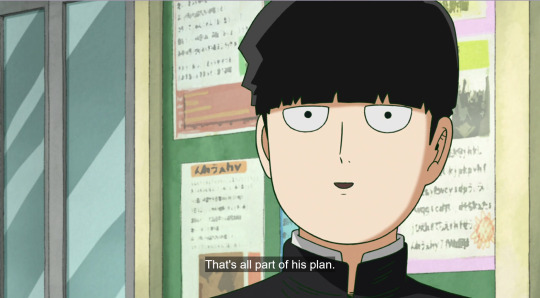
- that led to him being unable to accept the contradictions within himself, and so reigen laying those bare, the fact that he’s a liar and an exploiter, that he too, this person mob has admired and learned from for the whole series, has a part of himself he hates for how it thinks of other people, is what’s able to let mob finally accept himself.
reigen being a liar doesn’t make him an evil monster who deserves nothing but mob’s resentment - and in turn, mob destroying the city and trying to kill his friends doesn’t make him a violent, hateful murderer. it makes him and mob flawed humans, whose relationship couldn’t ever have healthily continued if those things weren’t unpacked - if reigen never honestly confessed about who he was, if mob kept forgiving reigen without looking inward to ask how he felt. at best, it would have been shallow and dishonest for them both until the end, and at worst... well, mob wouldn’t have been able to repress his emotions, dangerous as they are the more he hides them, forever...

this is why the scene of mob breaking down and crying is so important to me. finally, he feels safe expressing ugly, crude, selfish emotions. until now, when we see mob cry, it’s either tasteful tears running down his face, not changing much of his actual expression, or the complete opposite direction in exploding and bawling his eyes out with 100% sadness and 100% rejection - either mob’s emotions are pretty and subdued, or soul-crushing explosions he has no control over.

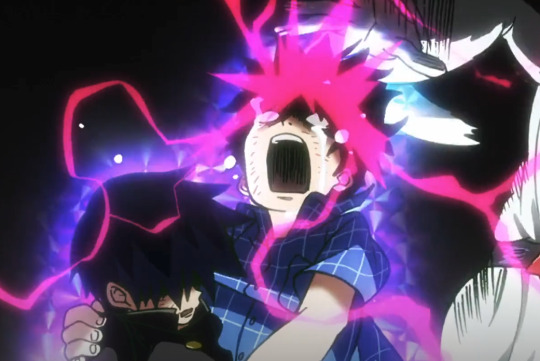
(sidenote: 100% rejection is one of the coolest explosions in the series to me and i wish it was talked about more!)
now, though, with the reassurance that he can cry, full-on cry, and it won’t hurt anyone, that he isn’t some selfish evil for being a middle school boy devastated he got rejected by his crush, that he’s allowed to feel broken up and miserable and have it not be an explosion that destroys the city... he cries! he feels all those negative emotions he’d held back, and because he feels safe expressing them, they’re not dangerous at all, they’re just... again, a middle school boy crying because he got rejected by his crush.
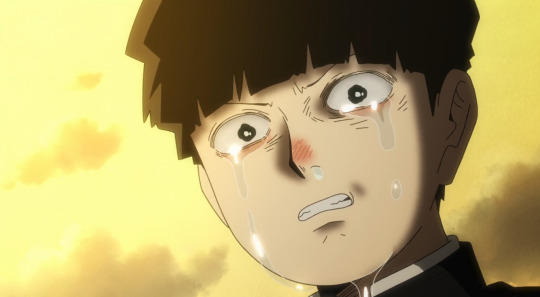
mob’s emotions, on their own, aren’t dangerous. it’s his refusal to express them, and the violent outbursts that leads to, that is.
something i love so much about mob psycho 100′s ending is that it’s not an ending at all. it’s just the beginning - finally, after three seasons, mob can actually feel and safely express his emotions. he can be on even footing with teru, reigen, all of them. he can start balanced, open, communicative relationships with those around him, showing that the compassion mp100 preaches goes far deeper than simply forgiving those who hurt you, or giving people chances.
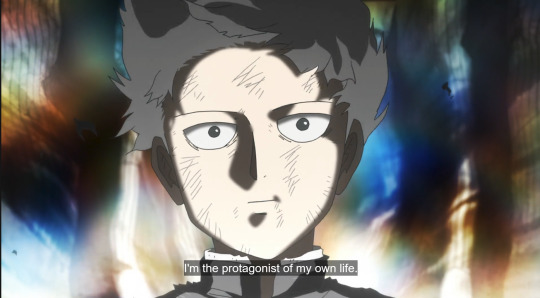
mob’s kindness is so, so, so important to me, and where season 2 was about extending kindness to others, culminating in mob sitting down with touchirou after deciding that letting him die alone would only have been needlessly cruel and reinforcing the man’s worldview that he needed nobody, and that extending kindness towards him was what he needed to properly change - season 3, culminating in mob confronting the parts of himself that may have wanted to leave touchirou behind, is about extending kindness to yourself.
#babbles#long posts#mp100#mob psycho 100#mp100 analysis#mp100 meta#mp100 spoilers#shigeo kageyama#mob shigeo#mob mp100#this is sorta rough as i think my first time doing a meta post like this but ough. ough. confession arc. (taking psychic damage)#it hits close to home as the. hyperempathetic autistic who struggles with separating kindness and selfishness its so damn good#mob so important to me. squeezing my plush so hard.
514 notes
·
View notes
Text
I’m so not normal about this

The way that Artemy tries to make Daniil feel better despite not caring solely because Daniil is upset, the “you are also better-crafted than me” like Artemy is telling him not to think of himself as some worthless unloved doll because look at yourself, you’re so much more than that; just that last line the compassion the kindness in it I cannot stand this. I’m not even that into Burakhovsky in canon but this is the most romantic thing I’ve ever witnessed in my life (←light hyperbole)
I’ve gotten too desensitized to the doll ending that I forget what a gut punch it is. That line “Strangely, there is still not a word to be heard from the Powers That Be. Perhaps they became bored of it all... or were called back home for supper” plain devastates me. Just the futility of it all, how pointless all the characters’ suffering was, in particular the healers’. Though I enjoy the theatre-framing in Patho 2, the ‘children’s game’ meta in Patho Classic gets under my skin far more, as there’s some ‘purpose’ in Artemy/Daniil/Clara suffering onstage, playing their roles for an audience. While Patho 2 implies futility with the ‘you aren’t important, you can be recast,’ that idea of ‘you are not important, and everything you did meant nothing’ hits me harder in the game framing because the healers aren’t even worth being replaced. Everything is just some kids’ make-believe that can be tossed aside when they get bored or are called away.
But I fucking love “The Powers That Be” concept because it’s so perfectly ominous and vague. Could be anything, likely the government, but sike actually it’s two children who orchestrated your entire living nightmare. I love the subtle references to them throughout the game, too, such as a plague victim telling Daniil “I keep hearing children’s voices... the girls are crying, and the boy is laughing... We mustn’t scare them...” or Aspity asking, “Pit-a-pat, pit-a-pat... Can you hear the kids running around?” And granted this might not truly be about The Powers That Be, but it certainly feels like it could be. Or the foreshadowing on Day 1 of the Bachelor Route when Daniil asks the kids, “How did it even cross your mind... to play epidemic!” And Clara directly references them when she goes underground with Artemy, warning him to talk as little as possible so “they who are beyond the wall won’t hear you.”
She elaborates:
“I can only feel them. They are obscure. They are the ones in charge of everything here. They’re big but narrow-souled, trying to hide their wretchedness from us. It was all their doing. They haven’t revealed themselves yet. [...] Their time hasn't come yet. They are waiting in the wings. They will probably break into the world when it ends. Tomorrow they will show themselves...”
I highly enjoy Measly and Thrush’s presence being all over the game unbeknownst to the player and characters (excluding Clara).
And it creates even more futility to me because there’s no catharsis of just anger against some cruel puppet-master, like I can’t be angry with these children who are just playing. Especially how they ask, “Heal the town, please! Just look, it’s so wonderful... It’s alive and it’s our favorite one... We won’t be able to make another one like this. If it can’t be helped, then it will disappear forever. You know how much we love it?” They’re just kids who want you to save something that they love; even if they can be devious they don’t really have malicious intentions. But even their fears about losing their town aren’t real and I’m just going to go outside and start eating handfuls of dirt
#to say nothing of the mishka's doll quest in artemy's route#pathologic#daniil dankovsky#artemy burakh#the powers that be#patho.txt
290 notes
·
View notes
Text
only halfway thru the new frieren episode i was almost tearing up because the theme of protecting each other and caring about life more importantly than winning is so poignant. not all the characters are human in species but once again the humanity is blossoming in frieren's story. i was so afraid they'd actually get killed last ep but i mean it's so funny now what was i even thinking. this is frieren. they won't kill unless it was really necessary.
the reveal that richter raised the platform not to make his fight with lawline and kanne easier but actually to protect them from denken's attacks was so good. the "magic is nothing if you cannot imagine it" line is so wonderful because i'm a big fan of magic systems that revolve around that logical "science-y" aspect of like. understanding how it will work in order to do it. (same reason why i love the magic in "world's greatest assassin".) laufen getting caught by frieren even though she knows it's a trap just bc she didn't want denken to get hurt was also so good. the reveal that denken didn't have a grander motive to be a first class mage beyond "i wanna go back to my hometown and visit the cementary there but only first class mages are allowed to enter" was so painfully human and so reflective of real life. it also strikes you because he was introduced as a high-profile, politically influential mage.
i love what denken says about not going out without a fight. i love that the episode ends in a fistfight for him. i love it when media uses fistfights and punching in such an emotionally-charged human way, beyond the violence, instead depicting it as some sort of catharsis really. because sometimes all you need is a good rough n tumble. in denken's case, it's his way of not giving up without a fight. i like that. i also like that this was foreshadowed by denken telling laufen to cut the tree down instead of trying to cut the restraint. "we don't have any mana" "neither do they". sometimes all it takes is to find a differently way to approach your problems and sometimes the solution is simpler than you think.
i'm a big fan of frieren breaking the barrier because she thought it was unfair to cut kanna (and by extension lawline) out of her source of magic, giving her an unfair disadvantage and honestly a handicap. it's a short part of the episode but it's so important, because it shows that if people are given the right tools and the accessibility, they can do for themselves what they want and need to do. i love that frieren is like "can you imagine winning against a water manipulating mage with water around? i can't."
i'm a fan of how the "basic" combat and defensive magic are depicted and treated as in this show. yes, people more on from traditions, but traditions are there in the first place. richter's explanation of magic history in their world provides an insight to how modern magic evolved from the foundations. but the foundations were still foundations for a reason. they made it a point with fern saying "frieren doesn't restrict me from spells" (even tho it was the setup for a small joke) that the point isn't to pick a side between tradition vs modern, but rather to learn from both and decide for yourself what you want to apply to yourself. the depiction of fern and frieren winning with traditional magic and richter and kanne overwhelming each other with modern magic makes it clear that the show isn't trying to preach to either side.
i also like the theme of "pursuing magic out for the sake of magic is enough". it's nice to hear that denken shares this mindset with frieren, because again he was introduced as someone influential and you'd think he thinks like he could use magic as a source of power. and that's the impression i got of him too from previous episodes, but a lot of first impressions of mine were proven wrong later and i'm so happy for that bc these characters have so much depth packed into them in so little time.
what else have i missed...
137 notes
·
View notes
Text
So someone asked me to make a post about Blake’s development so far in order to discuss the question of where Blake’s character can progress at this point in RWBY given that her arc with Adam wrapped up in V6 and she didn’t really carry a plot line in V7-8. I do media and story things for a living, but I’m also an intimate partner abuse survivor - needless to say, Blake’s story is important to me. Hopefully my perspective helps answer concerns about Blake’s story being “over,” because I think it’s very much the opposite.
(Continued below the cut because this turned into an entire essay.)
I want to preface this by saying I understand why it might be difficult to picture what Blake’s story looks like going forward. I largely credit this to the relative dearth of compassionate, healing-oriented narratives about abuse survivors in media. A lot of what we see is either revenge fantasies or stories about facing the abuser and arriving at a point of ultimate catharsis. In some sense, this is a broader fault in the standards of western storytelling, which is oriented around that singular, climactic catharsis, but that’s another essay. In truth, a mostly linear progression towards a pivotal point of recovery isn’t how healing from abuse works. It’s a messy process, and life is rarely as linear as in fiction. I think RWBY incorporates that nonlinearity into Blake’s arc very well.
Speaking of Blake’s arc, let’s look at that.
When we first meet her in volume 1, she’s introduced as an aloof, independent loner who’s very resistant to getting closer to people. Most of her classmates perceive her as mysterious and alluring at best, callous and cold at worst. Once we start to understand more of her history, it’s easier to see her attitude as the defense mechanism it is. She wants to keep people at arm’s length because she doesn’t trust them not to hurt her – but she also believes that she will harm people she gets close to just because of who she is. That whole Beauty and the Beast dichotomy, you know? Adam told her that she ruins things. It doesn’t help that he groomed her into a terrorist organization and thus her surrounding community has also labeled her a threat. She’s got a few overlapping layers of distorted thinking to work through when it comes to her image of herself and others. The way she perceives people is, at first, overwhelmingly informed by her traumatic experiences with Adam and the White Fang.
It’s pretty strongly implied that Blake bent the rules in the forest and intentionally selected Yang as her partner. When we first see Blake dashing around in the shadows, Yang is taking down a Grimm while sassing it to death. Blake talks later about how Adam’s charisma drew her to him initially, so it’s no surprise that when she was choosing her next partner, she gravitated to the same superficial qualities. During the first White Fang arc, after her self-destructive spiral, Blake starts to genuinely trust her teammates for the first time. That trust is tested when Yang fights Mercury. In this moment, Blake is confronted with the possibility that a pattern might be repeating itself: what if she was drawn to Yang for reasons beyond the superficial? What if Yang doesn’t just share Adam’s positive qualities, but his negative ones, too? The impulsiveness, the violence, the abuse – but Blake stops herself. She chooses to trust that Yang isn’t Adam, and she says as much. She’s accepting that Adam is in her past and electing to move forward. How perfectly, neatly linear.
Then the end of volume 3 happens.
For an abuse survivor, the idea that an abuser you’ve gotten away from might come crashing back into your life is possibly the scariest thing in the entire world. This is exactly what happens when Adam shows up, and Blake’s worst fears come true. He makes a point of hurting someone she cares about simply because he can to prove that he still has power over her. Blake runs because she thinks the only way she can protect the people she cares about is to be away from them. That paradoxical duality of (1) fearing harm will be done to her by others and (2) doing harm to others herself rears its head.
One specific question I was asked is why Blake talks about Yang so little in volumes 4 and 5. If Blake isn’t talking about the people she left behind, is she even thinking about them? I say, well of course she is. It’s coloring her entire attitude.
When Blake returns to Menagerie, she’s back in the place where she met her abuser. She’s at her parents’ house, a place that has been a symbol of everything she left behind when she ran away the first time. Now she’s run from another home. Menagerie is riddled with traumatic memories for her, both interpersonally and on a structural, systemic level. Everywhere she goes could be a place where Adam said something awful to her, made her obey him in some way, asserted control. She also has to confront him in person again, too.
With Adam around, of course she’s not going to risk mentioning Yang. He got one inkling that Blake cared about someone else and cut their fucking arm off. The one time Blake mentions Yang by name, her voice cracks so obviously it’s like she’s forcing herself to get the word out. Through both of these volumes, Blake has other external goals, but she’s still trying to protect someone she cares about. At this point, she’s constantly struggling with two motivations: hope and fear. She wants to make the world a better place, but she’s terrified of what she’ll have to confront in order to do it because of what she’s already lost. Her choice to reunite with her team and fight shows that ultimately hope wins out.
In Volume 6, Blake and Yang facing Adam is essentially the B plot of the whole volume. He appears in flashes before the major confrontation at the end, but the damage he’s done to both of them is intrinsically tied into Blake and Yang’s relationship throughout.
The end of this volume offers the climactic moment of confronting and overcoming the abuser. Afterwards, Blake collapses and cries. Catharsis! Yay! We’re done now, right? This may be why, to some people, defeating Adam is the obvious “end” of Blake’s character arc. Again, I’d argue that this perception comes from how abuse is often depicted in media, but there’s also a very intense pressure in the real world for survivors not to speak out and share their stories. Even people who are abuse survivors might not publicly claim that label for a multitude of reasons. Namely, it fucking hurts to think about it, and also sometimes people are real weird about it. I don’t blame anyone who doesn’t want to carry that weight around all the time. We can see some inklings of Blake dealing with this challenge over the course of the show, though they’re subtle. Early on, she explicitly avoids talking about Adam until she absolutely has to, and even when she does start to unpack what he did, she often talks about it with visible shame (averting her eyes, etc). Unfortunately, shame is a very common sentiment for abuse survivors to carry, and addressing it is a major part of Blake’s journey as she starts to heal in volume 6.
Another point of interest posed was to look at Blake’s role in volumes 7 and 8. There’s an argument that she doesn’t really do anything or that her role is as a somewhat generic support figure within the group. I wholeheartedly disagree.
While Blake doesn’t carry a plotline herself during the Atlas arc, she and Yang embody polarized attitudes towards the global conflict the group is facing, and that contrast serves the larger narrative very well. Because she was raised by activists in a context where she was constantly thinking about civil rights, Blake wants to address the broader ideological conflict at play. Yang, whose childhood consisted of raising her younger sister, wants to help people in a practical, immediate way. Blake is an abstract, big-picture thinker, and Yang is more focused on what’s right in front of her. This isn’t a dig at either of them; it’s just a difference in prioritites. At first, Yang worries that these differing priorities will be a source of tension between them, but when she and Blake talk things through they’re able to understand each other without judgment. Blake is learning to reconnect with the idealist she used to be in her early youth, someone who fought for a cause purely because she wanted to make the world a better place. She’s able to embrace that side of herself around Yang even though they have different priorities, and they’re still able to support each other’s goals.
Furthermore, on a purely interpersonal level in V7-8, Blake has interactions with other characters that speak specifically to the healing journey she’s been on. Yes, these are significantly quieter moments than a fight to the death on a bridge over a waterfall, but that doesn’t mean they should be written off. Quiet and peace are part of healing, and that doesn’t have to undermine the story’s integrity. Dramatic tension is still possible amidst this, as we saw in Blake’s talks with Yang where they discuss their team’s split strategic approaches. When Blake talks to Nora about the importance of not losing yourself in someone else, that’s her speaking from experience. She’s lost herself in a relationship before, and she knows how hard it is to come back from that, but she survived. She healed. The asserted importance of self-compassion in relationships has a unique gravity coming from Blake. She has a strongly developed ability to balance interpersonal empathy with community- and global-level stakes, which we’re already seeing glimmers of at the beginning of V9 as she steps up to come up with a plan on the island.
In summary, Blake’s arc isn’t just about that final showdown with Adam. She faces her abuser, runs away, faces him again, and again, finally evicts him from her life for good - and after that, her story continues.
She goes on to find ways to heal from her past. That process involves renewing compassion for her loved ones, her community, and the world as a whole; learning how to love without fear; and reconnecting with who she was before she was forced to become aloof and detached to protect herself. Although the circumstances of abuse convinced her that she was a coward, she is, and has always been, an incredibly brave character. She’s finally recognizing that at the current point in the story. Ultimately, I think this is the thing connects her to Yang and the rest of team RWBY so strongly: they’re brave enough to love and have hope even when forces of adversity tell them they shouldn’t dare to. Blake is a courageous idealist with a heart full of compassion, and ultimately not even Adam could destroy that about her.
My serious answer to the question of where Blake’s character will go now is that I think she’ll be a sort of de facto leader on the island as Ruby spirals into existential depression. Hopefully that arc resolves in a way that’s consistent with the show’s overall message about hope winning out, and past this volume Blake will still carry that optimistic but grounded revolutionary spirit and continue to be a center of compassion and hope.
My catharsis-oriented answer is this: aside from being trapped on a magical fairy tale island, Blake is free for the first time in a very long time, and she can go wherever the fuck she wants.
#it's time for KIE'S OPINION#blake belladonna#rwby v9#rwby spoilers#cw: abuse#tw: abuse mention#i have a lot of thoughts about blake. if you couldn't tell.#i went full english lit minor#anyway if anyone starts clowning on this post i will not hesitate to block your ass
417 notes
·
View notes
Text
I just want to talk about how TUA’s pilot episode uses specifically the Phantom Medley, ‘I Think We’re Alone Now’ and ‘Istanbul (Not Constantinople)’ as interconnected character (re-)introductions, because they are so, so good.
So, the Phantom of the Opera Medley gives us our first, mostly silent introductions to five out of the seven siblings. Everyone is doing their thing: Luther is on the moon, Diego is being a vigilante, Allison is at her movie premiere, Klaus is released from rehab and instantly relapses, and Viktor is playing the violin part of the medley by himself on a stage. It establishes what each of them has going on in their life, and it establishes that all of them are alone. The Medley is an instrumental arrangement of several songs from the musical adaptation of the Phantom of the Opera, which is an interesting choice in itself, being a story about a brilliant, reclusive, and unhinged genius who harnesses a young girl’s talent for his own personal gain. There is more to it, but this is the relevant part, for obvious reasons. This is also the scene where we see the siblings find out about the death of the shadowy figure that nurtured their powers and abused them for selfish reasons. If the medley had used the lyrics of the musical, the first song used in the medley – the main theme – has as its key lyrics the following: “The Phantom of the Opera is there, inside my mind.” And isn’t that something for the adults introduced to this melody, whose puppet master messed them up so badly during childhood that that still lingers in all of them, a throughline of that first season?
To this first introduction, ‘I Think We’re Alone Now’ serves as a re-introduction. It’s the same principle: a musical montage that focuses on each sibling to an overarching song. The theme of being alone is carried through, but this time, surprisingly, they’re not lonely. They’re not unified, they are certainly not getting along, but you get a feeling of their shared past. There is something that tethers them together. And where in the Medley, only Viktor could hear the music, because he was playing it, this time, the music is fully a part of the world. They’re all listening to the same song. They’re alone, but they’re not. They’re alone together, which is a step closer than it was in the Phantom Medley. And while the first montage focuses on what they were doing, established their occupations, this montage just gives us them…being. Existing, without anyone watching. Not their father, not the other siblings. We get such good insights into their personalities. Luther’s un-awareness of his own body leading him to accidentally punch the plane model. Diego’s array of dorky dance moves. Allison’s hesitance before she gets more and more into the song and allows herself to let loose. Klaus dancing with the ghost of his father. Viktor’s dancing being contained and unassuming. The title line, ‘I think we’re alone now’, just perfectly fits, and it’s a great example of visual media recontextualising a song’s lyrics. The original song is about sex, specifically the prohibition and taboo of teenage sex, and with the framing of the show, the lyrics instead become as literal as they could be. “Children behave / That's what they say when we're together / And watch how you play / They don't understand,” becomes about their childhood, about how they were never allowed to be kids, how they had to obey their father’s whims. And now he is gone, and they are alone, and it is good. Kind of. Sort of. While that iconic slow zoom-out visually shows that, their unity, despite all their differences, it is also all of them inside the Umbrella Academy. Them, and Grace, and Pogo, still in an environment that Reginald made. Reginald is still inside their minds. He is gone, but the structures he built, the damage he did to them is not. It’s this moment of catharsis, this instant where each and every one of the siblings allows themselves to be, to live, just for a moment, brought together by Luther playing a song loud enough for everyone to hear, where they think they’re free of Reginald’s abuse, and the rest of the show is them finding out that the death of an abuser doesn’t erase the effect he had. And then the music gets disrupted by someone quite literally crashing the party. But he crashes it from outside the house, because he is the one least concerned with (and, in this season, very clearly least affected by) Reginald.
Five gets his own musical (re-)introduction, and he gets it seven minutes before the end of the episode. Different from his siblings, we get to see his personality before he gets his musical key scene. And we meet him as a kid first, his arrogance, his powers, the use of teleportation to knock a guy out with a stapler. He then appears to inadvertently interrupt the first moment of unity his siblings have had in decades. He brushes off their father’s death. Casually reveals that Reginald has been dead to him for 45 years. It doesn’t matter to him. He has other things on his mind, but of course he doesn’t tell them, why would he? The arrogance is still there, his powers too. He’s insufferable, the viewer understands, and different. Different because he looks like a kid, a literal embodiment of the Umbrella Academy at its height, all knee-high socks and blazer, frozen in time, while at the same time having lived a very different life from his siblings. That’s all the viewer knows of him, by that point. And then ‘Istanbul (Not Constantinople)’ happens, and the understanding of the character shifts abruptly, as do the stakes for the entire show. While the introduction scene with the Phantom Medley and the re-introduction scene to ‘I Think We’re Alone Now’ are about these different siblings, apart, but maybe closer than they think they are, united by the loss of their father, ‘Istanbul (Not Constantinople)’ shows you that this one has a completely different set of problems from his siblings. Namely, he is being tracked down, a wanted man, a very skilled killer. The two montages are so calm in comparison to the breakneck (pun intended) pace of Five’s kill spree. He takes out half a dozen men armed with machine guns by outfoxing them, killing them with a wide variety of items in a wide variety of different ways. While ‘I Think We’re Alone Now’ contrasts the Phantom Medley, ‘Istanbul (Not Constantinople)’ contrasts the Five previously established in the show, especially his childhood self, and shows how his skills have developed. The innocence of the school uniform is quickly lost when he uses its tie to strangle a man to death. The first line in the song is ‘Istanbul was Constantinople / Now it’s Istanbul / Not Constantinople / Been a long time gone, Constantinople.” It’s about how something is technically the same thing – a schoolboy, perhaps – but time has irrevocably changed it, and it can never go back to that old version, because it hasn’t existed in a long time. It’s about Five, and it’s about the apocalypse, and the Commission, but it’s not about Reginald. ‘Istanbul (Not Constantinople)’ is the only non-diegetic song of the three discussed here, as in, it is not part of the show’s internal universe. The song is not playing in a jukebox in the diner. It doesn’t partially exist in the universe, like Viktor’s violin being the violin in the medley, or Luther playing the vinyl in the house. It is so different in principle and execution from the other two scenes, but it is still a scene meant to convey an understanding of the character, just like the other two are.
And despite it being purposefully and obviously different, I still think that ‘Istanbul (Not Constantinople)’ belongs to the other two scenes, that they form a united whole of introductions to the Hargreeves siblings. The diner scene rhymes with the other two, I think, in its marked differences, but there are threads that tie them together. How the violin is a key instrument in both the Phantom Medley and ‘Istanbul (Not Constantinople)’. How the medley shows the Hargreeves in the lives they had carved out for themselves away from Reginald, ‘I Think We’re Alone Now’ positions them in the house they grew up in, in the Umbrella Academy, Reginald’s domain, whereas ‘Istanbul (Not Constantinople)’ is set in a place where the kids defied Reginald. How the theme of loneliness and being alone threads through all of them. How the songs are, in order, partially diegetic (siblings apart but tied together by their past), fully diegetic (siblings enjoying the same thing despite being physically apart) and non-diegetic (the one sibling that is apart from them in age, time, space, part of his upbringing, you name it). How pertinent the lyrics are in each case, even the ones that aren’t technically in the song. I just think all three of them are brilliant needle drops that add so much to the story, the understanding of the characters and their relation to each other, just in the microcosm of this one pilot episode. Also they’re all incredible bangers.
#my meta#tuamre#Soundtrack#i love all of these scenes SO much they are so good at showing and showcasing these characters
198 notes
·
View notes
Text
Efficient Writing At Its Best
Is it me, or is there a noticeable jump in quality in No Princess Left Behind? As in, the animation budget seems to double between episodes, the cinematography is stellar, the humour is incredible. And the writing itself becomes so much more enthralling.
What gets me about this jump is that She Ra and the Princesses of Power was already a fantastic show. Each element I mentioned above is already firing on all cylinders. You would think that this show cannot improve any further, but in this episode it does.
Promise is lauded as some of the best She-Ra has to offer. And don't worry, I will get there. But No Princess Left Behind is my favourite episode of the show by far and one of my favourite episodes of television. This is the episode She Ra stops being merely an incredibly well-made show, and starts to become art.
Let me explain.
SPOILERS AHEAD
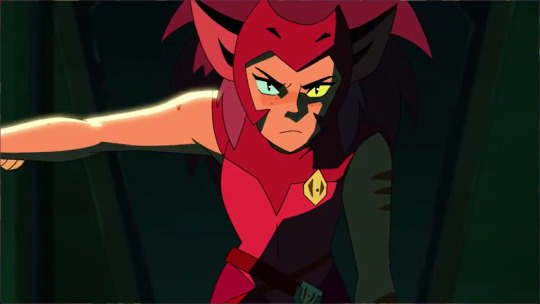
First up, format. This episode is a prison break and both a condensed monomyth and a miniaturised tragedy. None of these things make it great on their own, that's not how writing works. But they are written with incredible nuance derived from character, setting, and the intersections of those tropes.

A prison break is a self-explanatory story structure. A character is imprisoned and either doesn't want to be or has allies who don't want them to be. In the case of the external help variation, as with this episode, the plot functions as a medicine journey with the object of significance being the ally on the inside. (A medicine journey is just a journey to a place to retrieve a thing).
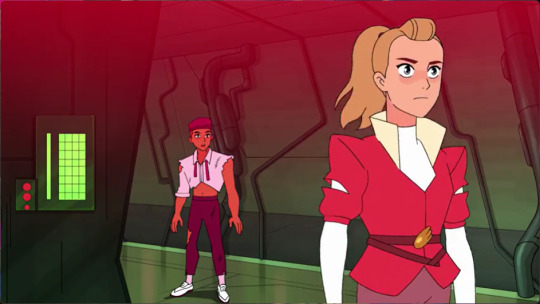
Monomyth is another term for the Hero's Journey. And there are two things about this that need to be understood: The Hero's journey is a set of guidelines, and the Hero's Journey is fluid. By which I mean, the format of the monomyth isn't set in stone, and if a story doesn't follow the specific set of rules you have found, that's not a fault.
In essence, the Monomyth is a set of common events that link multiple stories. Originally proposed in Joseph Campbell's A Hero With A Thousand Faces, the format has been changed over time through interpretation and through people leaving out Campbell's... biases (Misogynistic is an understatement for this guy). The form I am most aware of includes elements such as crossing the threshold, the darkest hour, and the metaphorical death and rebirth, all of which this episode hits in quick succession. If you want more details about the monomyth, I advise reading Campbell's book, or this article by Owlcation. TedEd also has a neat video on the subject.

A tragedy is the most well-known story type. Or rather, you say tragedy, and people generally get what you are talking about. It's a story with a sad ending. But there is more complication than that. Beginning in Ancient Greece, a tragedy is a way of experiencing powerful emotions in a safe environment. Loss, pain, hope, joy. A tragedy is a rollercoaster and is an incredibly good way of achieving that effect. To the point where stories that aren't tragedies (Like She-Ra) are frequently written as them and subverted at the last possible moment. OSP has a video going into detail, but in the interest of this analysis being shorter than a Tolstoy book, the words to understand are these:
Hamartia - Fatal flaw
Peripetea - Reversal of fortune
Catharsis - Emotional release
Bear these in mind because these are situational, and I will be talking about how in a moment. The point is this episode is incredibly efficient at showing each character's strengths and weaknesses and having them affect the plot. Each character has some moments to shine, and that final gut punch is caused by the characters' mistakes. Thats why it hurts, because it was both unlucky and inevitable.
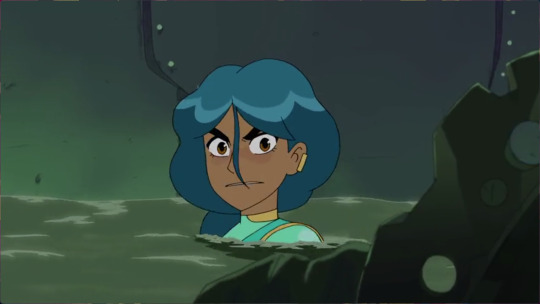
Mermista and Sea Hawk steal the show for me, for completely opposite reasons.
I have always believed, somewhat falsely, that the most well written scenes are those with less dialogue, because the rest of the acting can speak for itself. The minour acting and surroundings can shine if there is less dialogue to distract. Mermista is an example of this, but also an example of why this belief is wrong.
Mermista is the queen of subtlety, with so much emotion and meaning being portrayed by so little. She is exaggerated, sure, but she is a lot more subdued than the entire rest of the cast. What she does have, is expression. In the sewer scene, her head is the only thing visible, and she has more character on display in twenty-two seconds than Swiftwind has in the whole series. She doesn't even speak.
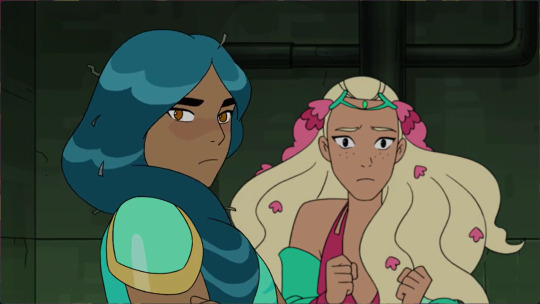
But when Mermista does speak, there is something fascinating happening here. Mermista's lines are saying a completely different thing to her animation, actions, and even the inflection of how those lines are delivered. Mermista goes out of her way to put up a facade of not caring, but she is remarkably affected by her surroundings and the people around her.

For example, despite herself, she grows attached to Entrapta, and gets excited when they work as a team. But I find this gesture so much more revealing. She tears up. But instead of crying, she quietly turns away and dries them. Mermista's Hamartia is also her greatest strength, her distance. She is pragmatic, but she pushes herself too far away to help.
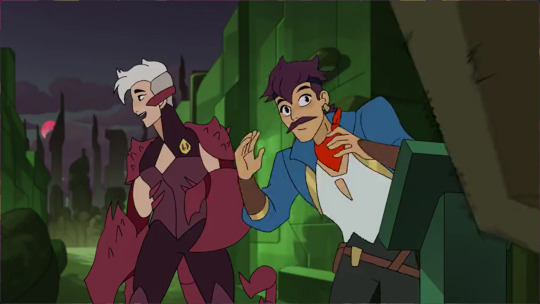
Meanwhile Sea Hawk is a TTRPG bard. This isn't even subtle.
For those who don't know, in DnD and Pathfinder, a bard is a charisma-based class that plays support most of the time (although you can build it in whatever way you want, this is how the class is designed). This means that they often end up as the party face and the glue of the group. There is a prominent live show in which a Bard leaves the party, and it shows off my point exactly.
Sea Hawk is easily the most charismatic character on the group, a fact he uses in a really interesting way. For one, he's distracting. His fast talking keeps Scorpia from being a problem for the group, and in every fight he is in in this episode, his primary role is to distract or annoy his opponents. He doesn't deal much damage, but he keeps himself as a piece on the board that gets on people's nerves and gets them to make mistakes.

Sea Hawk's constant babble is doing another thing for the group. He's reassuring and comforting. His number one priority at all times (successfully or not), is to keep everyone's spirits up. Sea Hawk is a master of inspiring. And would you look at that, DnD and Pathfinder have that as a core ability (Bardic Inspiration and Inspiring Performance respectively).
So, what is Sea Hawk's weakness? His optimism. I don't mean this as "optimism is foolish", I mean that Sea Hawk's hamartia is, much like Mermista, his greatest strength. Sea Hawk is always looking forwards, always keeping the group moving. When someone stops, it doesn't occur to him to look back until it is too late.
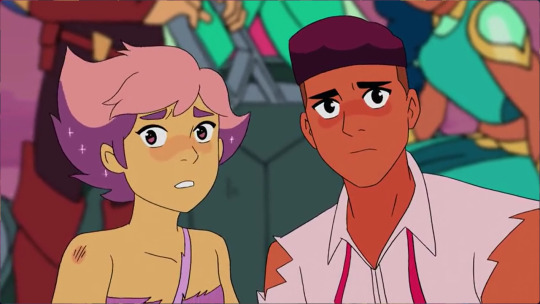
Glimmer and Bow are similar characters to each other, and it is in how they react to stress that that is shown. Both are resilient, but where one is resourceful, the other is relentless.
Bow is a simple character, in comparison to everyone else. Psychologically and physically. He doesn't have powers that can be restricted or that can get him out of trouble. What he does have, is his mind. Bow is clever and resourceful, and he works out a way of getting the right information while imprisoned so that the group doesn't have to work on that later.

Bow thinks big picture, once again his greatest strength and greatest weakness. He can strategize really well, but he doesn't expect the little things. Like Adora's surrender, or like the tiny detail that he overlooks: Entrapta likes robots. It's so small and so natural to him that he takes it for granted.

Glimmer's fatal flaw is obvious already. It's her stubbornness that got everyone into this situation, and that directly causes the end result. This is Glimmer's fault. But Glimmer's stubbornness isn't always a bad thing.
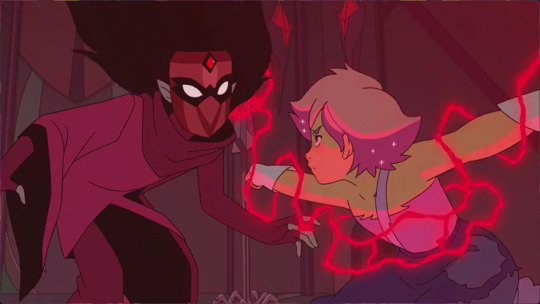
"It's a shame the toll this rebellion has taken on your family. First you loose your father and now..."
"She-Ra will stop you."
"There is no She-Ra!"
Shadow Weaver is a character who specialises in messing with people's minds. She enjoys control, and routinely underestimates the power of determination. To her all those around her are weak willed. But say what you want about Glimmer, the one thing she is not, is weak willed.
I love the line above because it is the first time anyone has managed to actually annoy Shadow Weaver. By this, I don't mean the same type of annoyance as Catra is to her, because I don't think Shadow Weaver cares about her enough to be truly angry. What Glimmer does here is win on Shadow Weaver's home turf.
Shadow Weaver tries to demoralise, and Glimmer blinks away tears, looks her square in the face, and remains stalwart. That's why I think Shadow Weaver shouts here, she's furious, and she can keep posturing, but Glimmer has won this little exchange.
Even with the reveal of the sword, I think its clear just how much Shadow Weaver is rattled, and I think this little exchange is the reason for her actions later on in the series.
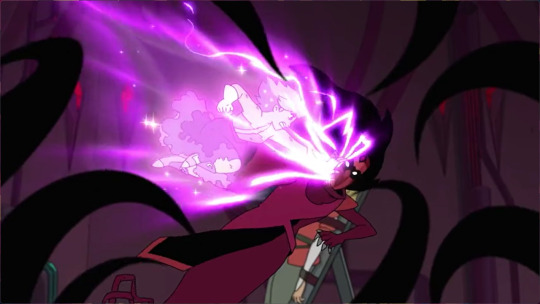
This is also on display here, as once again, Glimmer's raw determination and stubbornness blindsides Shadow Weaver, and it's telling what provoked this. Glimmer is protective of her friends first and foremost. And here, Shadow Weaver pushes too far, and the power of friendship prevails.
It's a minour moment of the theme for the rest of the series. Love, whether romantic or platonic, will overpower anything.
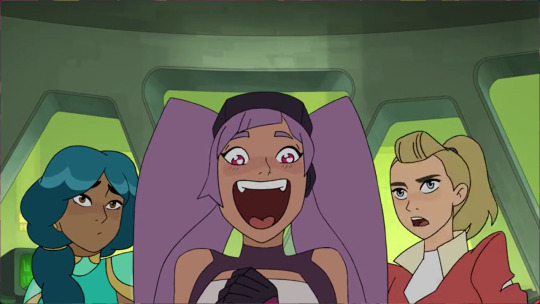
And finally, there is Entrapta. I don't think I need to explain what her strengths and weaknesses are. She's not hiding either.
What's important to note about Entrapta is that she is the convergence of the plot threads I mentioned earlier. The tragedy is her story, and this episode focuses in on that.

Her death scene is so powerful because it is so unfair, and so inevitable. It's quick, and unavoidable in the moment. Thie is the moment when the cost of this war finally sinks in. Yes, things happen later on, but it cannot undermine the gut punch that is this scene, and the final few moments of this episode.
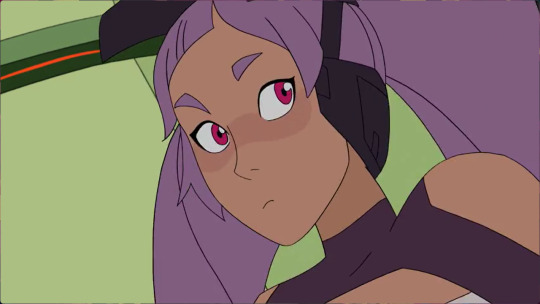
Peripetia is the reversal of fortune, it is the moment when all of the Hamartia comes crashing down and everything thereafter, and the tone changes. In Romeo and Juliet, this is the death of Tybalt (Spoilers).
Here, the Peripetia is the moment when Emily gets stuck, and those flames. It's the look in everyone's face as they realise what has happened and that brief shot of Entrapta's expression before. And it is that infernal siren.
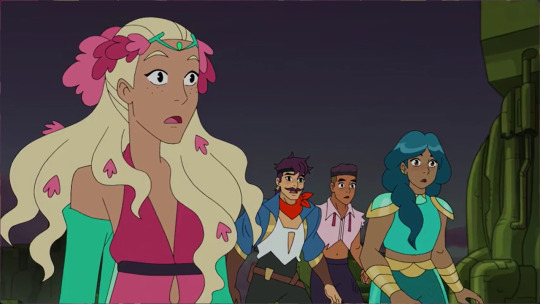
Catharsis meanwhile is the moment of relief, or setting out those emotions. Catharsis is technically not a part of the story, it happens when you stop watching and reflect.
But this episode offers you time to wind down. That brief shot of She-Ra turning back into Adora is powerful not just because of the music, but also because of how empty it is. There is no closure here, and the audience doesn't get it either. The episode ends on this:
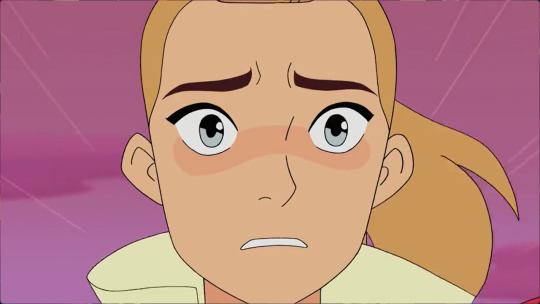
Final Thoughts
I didn't even have time to talk about Catra. She doesn't really do much here, but that scene with the sword is a nice bait and switch. Shadow Weaver is evil, all the characters are at their best and their worst simultaneously and I think that is quite cool.
Oh, and Perfuma. She has an extremely restricted worldview of what teamwork should look like, and Entrapta doesn't fit into that, hence the conflict. I think Perfuma learns to change slightly but doesn't get much time to do so in this episode.
Next week I'll be taking a look at The Beacon, so stick around if that interests you.
Previous - Next
#rants#literary analysis#literature analysis#character analysis#what's so special about...?#she ra and the princesses of power#she ra glimmer#she ra#she ra spop#she ra adora#spop#shadow weaver#glimmer#best friend squad#she ra bow#she ra mermista#she ra sea hawk#she ra entrapta
72 notes
·
View notes
Text
You know what is really bothering me about these last couple of days in Thai BL land?
Yes there were a lot of tears, but none of them were mine. (the exception being cherry magic. that sequence of Karan taking care of Achi and then being heartbroken. My heart wasn't ready)
These are my personal and maybe unpopular opinions so just let me explain. Spoilers galore as usual. We had some heavy episodes this week. Starting with 7 days before valentine and ending with the sign.
7 Days Before Valentine Look, was it heartbreaking? Sure. Did I feel sorry for Sunshine? Nope. Not even a little. Because for 8 episodes we've seen a selfish, self centered human being make a mess of the world without an ounce of remorse. Just picking people off one by one for his own selfish desires. So even if this episode was actually good, because he finally confronted his selfishness, I was watching wearing a big neon sign saying - you had it coming... the world's smallest violin etc...
Also we know he's not actually gone so. (this is the recurring theme of the week btw)
Pit Babe I mean Pavel did a great job and this show is doing a great job at showing men being vulnerable and crying. But let's be real. Charlie is not really dead. We know that. Omegaverse or not, this is Thai bl and we don't play that here.
So the idea to leave the audience in the dark is an attempt at a cliffhanger but ultimately void of any real suspense. If the audience were to be let in on the plan, I'm sure there is one, then we could've felt Babe's suffering in a more profound way. Because, in my opinion, that would be more powerful. We could've seen both sides of this and felt bad for both of them. What's the point of leaving us in the dark? Am I suppose to gasp next week when Charlie appears? When what will actually happen will be that as soon as we know Charlie is alive we will get angry at him for making the person he loves suffer and next at Babe because they will get right back to the papa and mamma talk before the I'm sorry leaves Charlie's lips.
Twins I mean, there wasn't really a lot of suffering left to be had here. I was the only one suffering due to the fact that this show really waited until the last episode to make Sprite come clean. And to top it of, making First feel even more like a door mat by forgiving Sprite so fast. What a waste.
Last Twilight I've already said my peace about this show a couple of times. I did feel Mhok's pain. Him alone crying outside the house was heartbreaking. But the problem is how it happened. Idiotic. The catharsis didn't have the time to actually be cathartic for Mhok. The noble break up was not noble. So in the end I cannot emotionally connect to any of this. They threw Mhok's nightmare in there in case we'd forgotten about his baggage, or maybe because they had, so that sudden confession of Mhok had diminished impact as it was followed by the break up which of course is the real heartbreak I guess.
The Sign What is up with the editing of this show?
I already said somewhere last week that I thought the editing of the rescue was terrible because it was not done as to invoke any emotional impact. The same happens this week.
What the hell was that cut after Phaya woke up? We had like 15 seconds of them looking at each other and Phaya reaching out before they cut to Dr ican'tkeepupwiththenamesatthispoint and then to the police story line that let's be honest, it's taking space from everything else that's more interesting and it's not giving us anything of value in return. Stop putting everything but kitchen sink into shows if you can't manage it properly. If you don't have space for these stories to breathe and give me something I'm missing in the main story lines. Look I love that Phaya got up from his hospital bed and immediately went for it, but I mean what am I suppose to feel about it? The show is not letting us settle into any one emotional state long enough to feel anything at all.
And, I'm really asking. Is anyone at all interested in the police investigation? You can have a police investigation as backdrop to a story. But if you're also gonna take it upon yourself to have this massive mythological, past and present lives star crossed lovers story, then something's gotta give. Maybe just make it a case that doesn't also span generations and brings secrets and lies along for the ride.
I'm so mad at Thai bl at the moment. Not you Cherry Magic, you are my precious ray of sunshine in the middle of all this rain. Please be good till the end.
[Thank you @twig-tea for being my proofreader. You're the best. 💜]
47 notes
·
View notes
Note
sorry to go back to the succession asks, but what do you make of the fact that a major part of the horror of what kendall did to the waiter is that he got away with it? i‘m never quite sure what to think, especially in reference to the real not real and making him fundamentally unable to be as much of a person as everyone else of it all + him ultimately denying it ever happened and this sort of dooming him in the finale
dodds dies because kendall, like the other characters of his social class, doesn't view those below them as real people with lives that matter. after the fact, kendall certainly experiences regret and guilt, but as long as logan is alive, kendall can't come clean (publicly) and so he can't get the catharsis of punishment. this is why he compulsively shoplifts in season 2. fundamentally the tension here is between the class position kendall was born into (culminating in ascension to the ceo position) and the idea of respecting or valuing waitstaff (& other service workers). kendall can do what his father demands of him to become ceo, or he could radically upend his life by, say, confessing to the manslaughter---but he can't do both. so, for seasons 2 and 3 he's walking around with a tormented conscience, though ofc not tormented enough to take precedence over his desire to impress logan and ultimately become ceo.
after he confesses to his siblings, we see in season 4 that this seems to assuage his guilt: if they can forgive him, he must not be that bad a person (again, this goes back to how he values the opinions of others in his class over the actual life of a waiter). so when shiv finally brings up dodds in the finale, it resurrects the old conflict: what she's saying is that kendall did a bad thing, and that this should prevent him from being ceo (this also shows how shiv has faith in the morals of capitalist institutions & power). kendall's response finally settles the conflict. he can't be a person who seeks the ceo role and also be a person who wrestles wirh the moral weight of having killed a waiter; it's a crossroads for him. he sides with his class, throws his hat in the ceo ring, and finally disavows any care or compassion for dodds by simply blocking out the merest acknowledgment of his death.
big-picture, the suggestion here is that no one can become ceo of waystar (which is ofc a metonymic position) without embracing & benefitting from the sort of calculus kendall makes: capitalists' lives matter, workers' lives do not. thus, the roys' persistent mistreatment or (at best) invisibilisation of their staff, servants, &c throughout the series is not some kind of unique moral failing of theirs---it is simply an outcome of the structural factors that create their massive wealth. waystar, which again is standing in for capitalism more broadly, can exist only as a consequence of labour exploitation and expropriation, which is to say that devaluing the lives of workers starts long before kendall's chappaquiddick incident. as long as kendall keeps his class position he will get away with the killing, even though he loses the ultimate crown of becoming ceo. there is no way for kendall to be 'moral' and retain his social power and privileges, because that arrangement is predicated on exploitation and the social logic that rendered dodds disposable in the first place.
110 notes
·
View notes
Text
the thing about representation (I'm thinking about ace identities but it applies broadly) is that. okay. a lot of what people talk about these days is wish fulfillment: the character who can simply exist without their identity causing them any hardships. sometimes this is because they live in a setting without the relevant axis of oppression, sometimes it's because of lucky circumstances, sometimes it's just an authorial choice. this feels the safest, in a lot of ways. it's comforting and can be very fulfilling: what if this character was like me, but they didn't get hurt for it?
but wish fulfillment is not catharsis. when you are someone whose identity *has* caused them pain, there is a value to escapism but there is also a value to reflection, to stories that show characters who have been hurt learning to be happy despite that. (and, yes, there's even value in stories where people don't get to be happy; they just don't tend to be something that I can personally read)
for me, a story that grapples with the complex realities of being marginalized but achieves catharsis can be a lot more powerful than a story where those realities don't exist. the problem is that the range of human experience is vast, and so a story that will be blisteringly cathartic for one reader could just be triggering to another. the solution isn't to say that only wish fulfillment narratives are allowed, it's to acknowledge that many different people will need many different stories.
#and this is why i need to write the nichest possible ace fanfiction. thanks for coming to my ted talk.#ace stuff
171 notes
·
View notes
Text
yknow, no, i'm not done thinking/posting/being deeply angry about the whole "bbuuuhhh Astarion is gay and was made playersexual as a game mechanic bbbuuuhhhhhhh" garbage some people still spout.
like this type of sentiment is always annoying and wrong, but it's specifically this character for whom it's especially annoying to me, just because on top of all the regular host of issues, it also deeply contradicts what I believe is the central theme of his whole goddamn story.
(excuse the rant please.)
Like, my skin already crawls at that term, "playersexual". I hate it, and find its use either vaguely ignorant at best, or blatantly pan/biphobic at worst. but even just besides that....
This character is a man whose narrative intentionally shows his presentation of himself, and of his masculinity, as being contradictory with convention. This character is one whose entire arc is about discovering who he is beyond the boxes he was assigned: a spawn, a monster, a seducer, a tool, a predator, a plaything, a victim, a sexual object... these are all identities that were forced onto him. And if he's given space to discover them, turns out, none of them are things that he actually wants to be. if you give him space, and affection (romantic or otherwise), and acceptance, and help him attain closure and catharsis, he expresses desire to be... an adventurer, a lover, a friend, a protector, so many things, but all of them in his own way. That's the point of his story, control vs. autonomy.
How.... myopic does one have to be to see that story, to play that story, to play an active, participatory role in that subversion, that search for the self beneath the masks, and declare that actually, they made him this other box for him to fit into, so... it's fine, i guess, to ignore what he says?????? it's fine if they pick and choose among his expressed traits which ones to use and which to disregard, because they decided (based on frankly homophobic and rather misogynistic stereotypes) that he cannot be different from their perception, despite him literally saying otherwise????????
Astarion's entire figure is a succession of trope-subversions. I could write essays about all the ways in which, in the romanced spawn game, the narrative sets up tropes (primarily in act 1), only to then purposefully knock them down and contradict them as the game progresses.
Like..... He was to take revenge by taking power for himself (like he thought he wanted, like Cazador did to Vellioth): ended up taking his revenge and rejecting the power that could have come with it, and despite that having a price, being content and grateful for it (and realizing that the alternative would have had an even greater price he would have paid unknowingly). He starts out using sex and sexuality as a weapon, and a tool of manipulation, like he did for many decades: ends up expressing discomfort with being seen as a sex object, resuming his sex life by saying "I love you" before his partner would have, and proposing sex with them as a beautiful metaphor for his own rebirth.
His whole story starts out with him thinking he requires protection from the player and that the only way to get that is through using his body and looks as a bargaining chip: later he discovers in himself a desire to be the protector himself, which he talks about more than once, and expresses varying degrees of discomfort at the thoughts of both using his body to gain something, and needing a protector.
There's the "this is what I'm good for" type of attitude towards sex morphing into "I am so much more than a thing to be used". There's the whole thing about how important his looks were to both him and his "usefulness" back then, despite him not being able to even fucking see them, (which also kind of includes that silly lovely gremlin-face he sometimes makes), but those are just the ones off the top of my head.
The story, and the romance plot, is about... it's about him regaining ownership of himself, it's about autonomy, his whole recurring "what do you want" line is about respecting his choices and letting him find his way to them, it's about letting him show you who he is, believing him, and loving the man behind the facade.
how absolutely fucking short-sighted does one have to be to then take that incredibly reductive stereotype of "femme-leaning man with theatrical mannerisms who cares about his looks; must be exclusively homosexual and any attraction he shows to women is just a mechanic/fanservice/flattery" (which, that's so fucking insulting to gay men, and bi/pan men, an any man who might express masculinity in a less than conventional way, and to the women who may love them [eta: and of course nonbinary people, and the people to whom masculinity means something wholly different]), and assign it to this character on their own accord, despite him literally telling the player otherwise? despite him verbally expressing attraction to multiple women, and contradicting that stereotypical interpretation wholly and out of pocket??????
like, hello??????? did we play the same game????????? did we play the same fucking game??????????
like don't think for one second that it isn't the pan/biphobia that annoys me more, it absolutely is, but this character is such a particularly egregious example, it's almost fucking poetic.
#squirrel plays bg3#i feel like this needs a tw but i just. cannot think of what#i'm just..... annoyed. and ranting. and my brain is full. and i'm hungry.#point is; where Gale's central theme boils down to an exploration of devotion#Astarion's is about autonomy#these are the only two i've done so far so i've not yet looked this much into the others#next is gonna be me ranting for hours about Shadowheart's theme of sacrifice; just you wait#(i hope the person who replied to this post; deleted their reply; and then blocked me#knows how heartily I just laughed at that little sequence of events)#(it's like seeing; idk; a bottle of nice healthy kale-spinach juice discarded in the liquor aisle of a supermarket)#(a telltale sign of DecisionsTM made)#(I can respect a “yknow i don't want to engage with this today”)#(even if i will just outright say that i believe i'm right)
37 notes
·
View notes
Note
Opinion on chumisa? She’s gorgeous but haven’t heard much of her
So, keeping in mind that I tend to just skim over reviews and I don't really get hyped over actors a lot...
I really liked her. Like, she was very, very good.
And it's pretty incredible considering the video I have of her that she's only barely started the role, but there we are: Chumisa Dornford-May feels like she came into the production already having a good idea of exactly how she wanted to play Christine and how she wanted to act certain scenes and string it all together to show her character's arc, and she went and did it. Now all that's left is for her to refine it.
Some highlights: from the get-go I loved how she played 'Think of Me'; I think it's very tempting to go the happy, joyful route a la Gina Beck, and I like that interpretation! But she acted the song in a way that was more appropriate to the lyrics she was singing, sometimes nostalgic, sometimes wistful, sometimes distant and grieving. It gave me a great sense of Christine as not only a good singer but a good performer too.
In terms of whether she was a Phantom or Raoul girlie, I'd honestly say neither, though if pushed I'd say she maybe leans a little more towards Raoul. Her Christine in the lair scenes was not necessarily afraid or angry at the Phantom, but she did feel rather resistant to him, especially compared to some of the other Christines in the role right now (e.g. Lily Kerhoas and Colleen Rose Curran). There were moment where she would melt a little, seemingly going, "Oh, this is kind of nice", but much of the time, she appeared more wary than anything else, unsure of what the Phantom was up to.
I also say she's not quite a Raoul girlie because she acts similarly in the rooftop scenes. In particular, her 'Why Have You Brought Me Here' was played like she was trying very hard to convince Raoul of what she saw and was angered that he kept trying to calm her down rather than actually attempting to understand her. Her Christine doesn't just want to tell Raoul what's going on, she wants him to believe her. She was also noticeably less giggly than other Christines during 'All I Ask of You', at least in this performance, and I liked how it kind of flips the dynamic between them: whereas earlier it was Christine trying to convince Raoul, now he has to be the one to convince her that all is goodness and light, and I'm not fully sure she bought into it.
What else? Oh, in 'Twisted Every Way', she did something that I first saw Yang Chen Xiuyi do in the Chinese production, which was to turn very hopefully towards Raoul when he says, "Christine, Christine, don't think that I don't care..." It's like she thinks, or wants to think, that Raoul is going to back down and call off his plan, which makes it all the more devastating when he doesn't.
And finally, by 'Point of No Return' and 'Final Lair', her Christine had definitely reached her limit with the Phantom. I really enjoyed how you can see Christine working out that it's the Phantom onstage with her during 'Point of No Return', slowly drawing out her phrases as the wheels in her head spin and then committing to continuing the show to catch him. (Never mind about the stuff after.) She delivered a truly contemptuous, "Please, Raoul, it's useless" in the 'Final Lair', and I think she gave a truly angry kiss to the Phantom. It felt very similar, interestingly, to her dynamic with Raoul on the rooftop; she seemed to be using the kiss to desperately try to convince the Phantom away from his current path (using the power of making out to stop the cycle of abuse and trauma!). Such was the quality of the video that I'm pretty sure I saw tears on her face during the kiss, and Chumisa Dornford-May played it, I feel, like it was due to the overwhelming catharsis of emotions she was experiencing: anger, grief, betrayal, terror, all of it being released into this one grand moment.
The only flaws I really noticed had to do with her singing. Most reviews have pointed out she belts some of the score; I didn't notice it too much, but I definitely heard it during 'Wishing'. It wasn't the worst place to belt - she did it during the last stanza, where Christine is usually singing pretty loudly anyway, likely to add volume to her singing - and I didn't mind it too much, but it was jarring. There were also a few parts where her voice was a little quiet, and small scenes where Christine was not the focal point but she could done a little more in her acting, or just paused and let the scene "breathe" a little (which, in fairness, is something most actors new to a role will do, rush through the show).
But honestly, those were minor nitpicks in what was otherwise a really great performance. And this is her early in her run? I can only imagine what she'll be like with a few more months under her belt!
23 notes
·
View notes